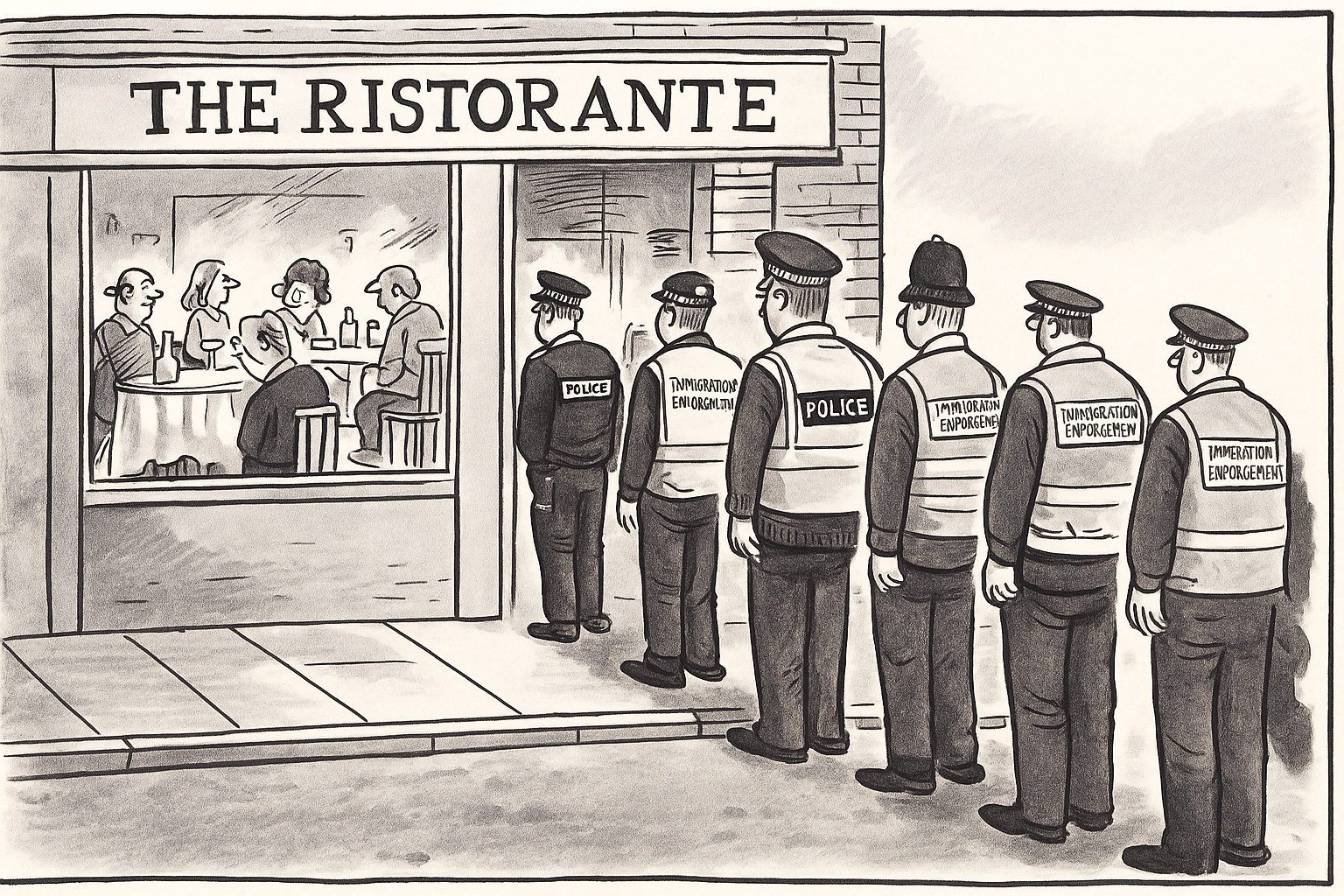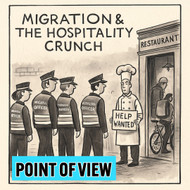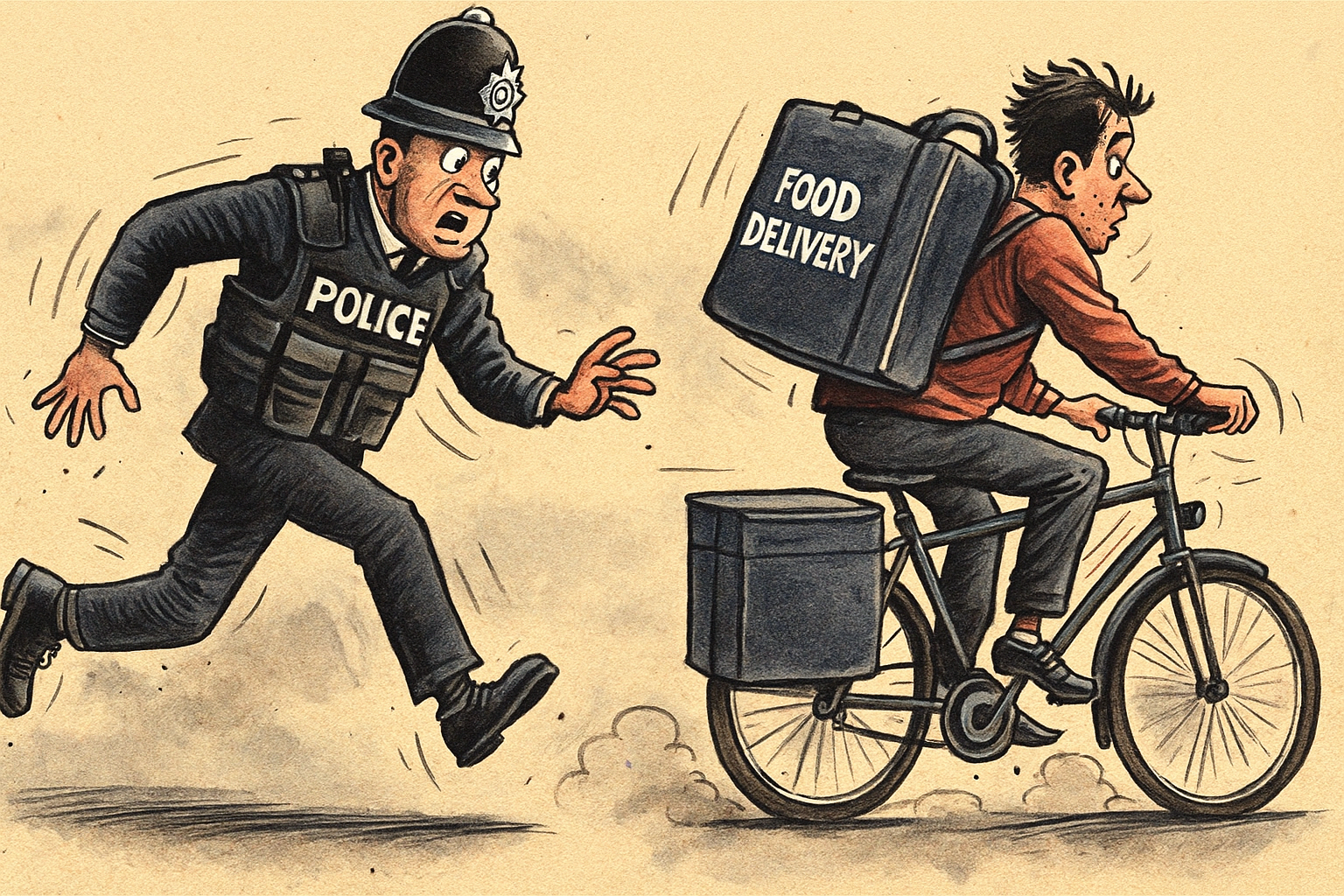Serving Britain: How Migration Built Our Hospitality Industry — and Why We’re Breaking It
Posted by Stelios on 10th Oct 2025 Reading Time:
Britain loves to eat globally but fears hiring globally — in this weekend deep dive, I explore how migration crackdowns are reshaping the UK’s kitchens, cafés, and couriers.

Few industries reveal Britain’s contradictions quite like hospitality and fast food retail.
We rely on global talent to keep our kitchens humming, our plates filled, and our deliveries running — yet we act as though that same global talent is somehow the problem. The immigration debate often revolves around borders and boats, but the real story plays out much closer to home: in chip shops, cafés, bakeries, hotels and on the backs of e-bikes criss-crossing British cities.
As someone who spends his days talking with business owners, chefs and suppliers across the country, I see it everywhere. Migration is not a threat to hospitality — it’s the very thing keeping it alive.
A System Built on Movement
Walk into any busy restaurant or hotel and you’ll hear the rhythm of international voices — chefs from Italy, servers from Poland, cleaners from Ghana, bakers from Bangladesh.
As of late 2024, over 60% of hospitality workers in the UK were born outside Britain, according to the Migration Observatory at Oxford University. These are not stopgap workers. They’re the backbone of an industry that contributes £93 billion a year to the economy and employs 3.5 million people.
But that backbone is weakening.
Visa grants for chefs and food sector roles fell by 73% in the second half of 2024. Salary thresholds for skilled worker visas jumped from £26,200 to over £41,000. Even long-established roles — chefs, bakers, butchers, restaurant managers — were stripped from the Skilled Worker list entirely.
The government insists this will encourage employers to “train domestic staff.” But in reality, it has made one of Britain’s hardest jobs even harder. Hospitality doesn’t have a domestic queue of trained chefs waiting to step in — and while unemployment remains low, the recruitment pipeline is drying up.
The Reality on the Ground
I’ve mentioned many times on The Ceres Podcast that delivery aggregators and labour costs will inevitably rise as the government rightly cracks down on illegal working. But that raises uncomfortable questions: will this mean the law itself has to change? Should asylum seekers waiting for their cases to be heard be allowed to work legally? And if they are — does this risk devaluing low-skilled work for British citizens?
It’s a messy, complex debate with no easy winners. Whatever changes, someone’s bound to feel short-changed.
Every week, I hear from operators who’ve lost skilled staff overnight because their visa sponsorships lapsed or the criteria shifted mid-year. Some cut hours or close two days a week just to cope. And when the legal channels shut, a shadow economy opens up.
In one ITV investigation, a delivery rider — an asylum seeker from Pakistan — was found working illegally for £5 an hour, half the minimum wage. He wasn’t stealing jobs; he was surviving. Sky News filmed similar raids in Bristol, describing it as a “constant game of cat and mouse” between immigration officers and riders renting fake app accounts.
When legitimate routes close, desperation fills the gap. Migration doesn’t stop; it simply goes underground.
The Cost of Control
And yet, enforcement cuts both ways — not just for those working illegally, but for those trying to do everything right.
Employers face ruinous fines for hiring someone with false papers — even unknowingly. Workers risk arrest, deportation, or exploitation. And honest operators, already battling cost inflation and staff shortages, end up competing with those cutting corners.
Many in business who do things properly still end up treated heavy-handedly by the law.
We recently wrote on the Ceres Blog about Mandira’s Kitchen in Surrey — a legitimate, successful café that had immigration officers storm through the doors. Every employee was working legally, yet imagine how that scene looked to customers and staff.
And this isn’t an isolated case. In Egham, Surrey, Big Fry Fish & Chips owner Mark Sullivan was fined £40,000 after unknowingly employing a worker who allegedly used a false identity. Despite carrying out right-to-work checks, including passport verification and PAYE registration, Sullivan said there were “no red flags” and described the situation as a “genuine mistake.” The fine left what he called a “massive cash flow hole” in the business — a cautionary tale for small operators trying to follow the rules .
It goes without saying that the government must chase down illegal immigration. But surely it must also tread carefully when businesses are trying to do the right thing. Innocent until proven guilty still matters — and in a small community business, reputational damage can outlast the raid itself.
 Mandira Sarkar, owner of Mandira’s Kitchen in Surrey, faced an immigration raid despite running a fully compliant business. Read more.
Mandira Sarkar, owner of Mandira’s Kitchen in Surrey, faced an immigration raid despite running a fully compliant business. Read more.
The Balance Between Opportunity and Oversight
Migration debates often become moral scorecards: good or bad, right or wrong.
But the reality is far more nuanced. For every story of exploitation, there are dozens of success stories. Many migrants start at entry level and climb their way up — from kitchen porter to head chef, from delivery driver to restaurant owner. They don’t just fill jobs; they create them, reinvigorating local high streets and training British apprentices along the way.
Still, the system that enables those success stories is buckling. Businesses are desperate for clarity and fairness.
Kate Nicholls, Chief Executive of UKHospitality, put it plainly:
“We understand the Government’s intention to reduce migration, which comes on the back of additional restraints on hospitality last year.
When imposing these restrictions, the Government has to bring forward an employment and skills strategy to further drive domestic recruitment.
Hospitality recruits more than three-quarters of its workforce from within the UK and measures like apprenticeship levy reform, the introduction of foundational apprenticeships and investment in pre-employment training can allow us to go even further.
Against a backdrop of £3 billion in additional employment costs hitting hospitality businesses, such a strategy is critical if the Government is to achieve its goal of getting more people out of welfare and into work.”
The Global Context Britain Ignores
Other nations have faced this same challenge — and responded pragmatically.
Australia uses a points-based system that specifically recognises hospitality roles like cooks, bakers, and baristas as essential skills.
Canada operates a Temporary Foreign Worker Program that matches migrants directly to regional labour shortages, ensuring supply meets real economic demand.
The UK, by contrast, has gone in the opposite direction — narrowing eligibility, raising salary thresholds, and removing key food roles from visa lists entirely. It’s not competitiveness; it’s self-sabotage.
When Wages Collide with Reality
The truth is uncomfortable: migration can affect wages, but not in the way people assume.
According to the Bank of England and the Migration Observatory, downward pressure on pay is concentrated in semi-skilled and unskilled sectors such as hospitality, retail, cleaning, and haulage. When more people compete for similar roles, wage growth slows — yet that same influx also keeps businesses alive and prevents closures.
After the 2004 EU enlargement, a surge of Eastern European workers led to a small but measurable drop in wages for Britain’s lowest-paid service jobs — while higher-skilled roles actually saw increases.
Migration doesn’t drive down wages across the board; it flattens them where margins are tight and roles are easily replaced.
But that’s not the only factor. Tight profit margins, rising rents, energy costs, and tax burdens have far greater influence on pay than immigration policy ever will. When the economics of an entire sector are broken, blaming migration becomes a convenient distraction.
When Policy Becomes Politics
Successive governments, fearful of headlines, have treated immigration as a numbers game rather than a workforce strategy.
The obsession with reducing net migration creates impressive-sounding statistics for press conferences but catastrophic consequences for industries that depend on people. Every crackdown leaves more restaurants short-staffed, more takeaways turning to cash-in-hand labour, and more enforcement raids that miss the point.
The result? A bigger black market, not a stronger labour market.
The Economic Ripple Effect
The hospitality and food industries don’t exist in isolation. They sit at the intersection of tourism, retail, and logistics — and when staff shortages hit, the ripple spreads.
Fewer staff means fewer covers, reduced hours, and less footfall for surrounding businesses. Visitors spend less. Local economies contract. The Treasury loses out on VAT, PAYE, and corporation tax.
In short, restricting the people who make hospitality function doesn’t just hurt operators — it costs Britain growth.
The Productivity Paradox
At the same time, the UK faces an uncomfortable truth: there are millions of people of working age who are simply not working.
According to the Office for National Statistics, around 9.1 million people aged 16–64 are economically inactive — meaning they’re not in work and not actively seeking it. Add to that roughly 1.4 million unemployed people who are looking for work, and you’ve got over 10.5 million working-age adults currently out of the workforce.
That’s a staggering number in a country with chronic labour shortages. It’s a paradox — we have open jobs and idle workers, yet we’re building policy barriers that make both problems worse.
We can’t expect businesses to navigate all of this at once: tightening immigration rules, rising wage costs, chronic skill shortages, and a vast pool of potential labour locked out by circumstance or red tape. It all becomes a drag on decision-making and a deterrent to investment.
For small businesses, every new compliance rule or delay is a direct hit. Many don’t have HR departments or immigration lawyers — they have owners who already work six or seven days a week. Larger companies can absorb the paperwork and legal advice, but they’ll simply pass those costs on to the customer. In the end, it’s the independent cafés, takeaways, and family restaurants that crumble under the weight of complexity.
Delivery: The New Frontier of Hospitality Labour
As traditional kitchens lose staff, many of the same workers drift into gig-economy delivery.
Some are asylum seekers working illegally under rented accounts. Others are former kitchen staff supplementing low wages with late-night rides. Delivery aggregators — Uber Eats, Deliveroo, Just Eat — now form the hidden labour pipeline of the food industry.
The government’s new partnership with those firms, designed to share data and track illegal riders, is a necessary step. Yet it also exposes how deeply hospitality, retail food, and delivery are now interwoven.
If delivery labour becomes more expensive due to right-to-work compliance and enforcement, those costs will feed straight back to restaurants. And as prices rise, so will consumer frustration — creating yet another pinch point in an already stretched industry.
A Smarter Future
The answer isn’t to open the floodgates or slam them shut — it’s to design a system that reflects economic reality rather than political ideology.
We need:
• A Hospitality & Retail Service Visa Pathway for roles that can’t be filled locally.
• A Local Skill Exchange Initiative linking training programmes with regional shortages.
• Faster right-to-work verification to protect honest employers from bureaucratic traps.
• Enforcement that targets exploiters, not legitimate operators.
• A recognition that asylum seekers waiting years for resolution could contribute meaningfully — if the system let them.
We can’t eat ideology. Someone still has to cook.
Migration has always been Britain’s quiet success story — the unseen collaboration between ambition and opportunity that powers every kitchen and café. But if we keep tightening the screws, we’ll lose the very people who make that possible.
The government needs to be grown up and honest about migrants, immigration, hospitality, and the retail food industry.
Without them, the heart of Britain’s service economy won’t just slow down — it will stop beating.









